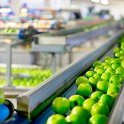Global Risk Perspectives - Monthly insights on geopolitics, trade & climate
Back to articlesCaio Carvalho

28.07.2022
Risk management in the food industry: working through the crises
With conflicts raging worldwide, how do we avoid damage and loss in this segment?
Being one of the most important segments in the Brazilian economy, but no less in the global economy, the food sector deals with major risk and responsibility on a daily basis. It immediately reflects the consequences of political, environmental and health conflicts, and it needs to face losses and expenses that all companies in the segment are exposed to.
We know that the coronavirus pandemic represented a hammer blow to import & export causing repercussions across the world’s economy. However, the food sector has demonstrated resilience and even thrived in this context. According to the Associação Brasileira da Indústria de Alimentos (Abia, Brazilian Food Industry Association), the Brazilian food industry posted R$922.6 billion profits in 2021; that’s 16.9% growth compared to 2020. Per this survey, exports represented 26.5% of total earnings, growing by 18.6%. That was a record number — roughly 45.2 billion USD.
Risk Management and the Food Industry
Although surveys indicate a clear recovery for the food industry, that doesn’t mean major risks for the sector have gone away. Currently, millions of items are de-stocked and recalled, either because they may have been contaminated, tampered with, or removed at the government’s command. Mindful of such threats and setbacks, the 2022 Brokerslink Conference, which took place in Oporto, Portugal, offered up relevant insights on this market and the risks surrounding it.
The event, where over 300 leaders in Insurance, Reinsurance and Risk Management gathered, featured a panel titled "Risk Management at Nestlé” on which Laurent Freixe, Executive VP and Nestlé Latin America CEO, gave us an overview of risk management at the company — one of the biggest in their line of business — and highlighted the need to adjust to an ever-changing environment to maintain compliance with obligations and legislation in every sphere.
Put simply, an effective and comprehensive risk management programme for the food industry must include a number of coordinated actions to neutralise, prevent and contain situations that may give rise to loss and expenses for businesses. The threat mitigation stage includes quantitative and qualitative analysis to determine which risks must be prioritized and, finally, completed with the definition of a response or solution that will eradicate identified threats.
In 2022, the challenges faced by the food industry remain, as previously, security for consumers before a scenario of uncertainty. To that end, we should point out that a good risk management programme coupled with use of technological tools is a fine option. No less, resorting to specialty software that can take on management tasks in a secure and effective manner, and paying attention to constant political, socioeconomic and logistic changes, are essential to the vitality and adequate performance of any company — however big or small they happen to be.
By Caio Carvalho, Director of Corporate Risks, MDS Brasil



